 |
| “Deliverance of Saint Paul and Saint Barnabas” by Claude-Guy Halle, c. 1700 |
Commentary:
Note: For this feast, the Gospel of the day (Saturday of the Tenth Week in Ordinary Time) is proper.
Reading 1: Acts of the Apostles 11:21b-26; 13:1-3
Commentary on Acts 11:21b-26; 13:1-3
The increase of believers outside of Jerusalem may be indirectly attributed to the efforts of the Sanhedrin in Jerusalem who drove out many of the Hellenistic Christians in Jerusalem. These pilgrims took their faith with them and planted the seeds of faith in Antioch (and other places within the Roman Empire). To effect consistent catechesis and evangelization Barnabas was sent to help form this informal community into a center of faith which in its turn launched others to fulfill the mission of Christ in the world.
Barnabas is sent by the body of the Apostles to investigate the situation in Antioch and to discover what Paul is doing. Recall, Paul went through his conversion on the road to Damascus and never received guidance or direction from the Apostles. The last they knew, St. Paul was still on the “other side.” Barnabas’ journey therefore was, at least until he reached Antioch, tense. Barnabas finds Paul in Antioch and the two of them begin an aggressive evangelical ministry.
In the second section (Ch. 13) we see Barnabas and Saul (St. Paul) sent out from Antioch to spread the Gospel. Saul the convert and Barnabas the Apostle were set apart by the Lord for this purpose and strengthened themselves spiritually through prayer and fasting before their journey.
---------------------------------------------------------------------------
Responsorial Psalm: Psalm 98:1, 2-3ab, 3cd-4, 5-6
R. (see 2b) The Lord has revealed to the nations his saving power.
Commentary on Ps 98:1, 2-3ab, 3cd-4, 5-6
The psalm is a song of praise to God for his saving work. From our perspective, knowing that he sent us His Son for our salvation, we see clearly the reference to Jesus as God’s saving hand is extended.
---------------------------------------------------------------------------
Gospel: Matthew 5:33-37
Commentary on Mt 5:33-37
Jesus paraphrases the Old Testament (see Exodus 20:7; Deuteronomy 5:11; Leviticus 19:12). He is attacking the practices of guaranteeing one’s promise by calling on God to witness the pledge. The Lord tells his disciples that no oaths should be made, that what they say should need no guarantee beyond their own character (“Let your 'Yes' mean 'Yes,' and your 'No' mean 'No.' Anything more is from the evil one.”). This last reference speaks of the implied sinfulness of mankind in oath-breaking.
CCC: Mt 5:33-34 581, 2141, 2153; Mt 5:33 592, 2463; Mt 5:37 2153, 2338, 2466
--------------------------------------------------------------------------------
Reflection:
St. Barnabas, whose feast day we celebrate today, is a remarkable figure in the history of Christianity. He was not one of the “Twelve” yet like St. Paul, his longtime friend and confederate, bore the title “Apostle.” Scripture tells us that he was born on Cyprus and was of the tribe of Levi (Acts 4:36). Born with the name “Joseph,” the Twelve renamed him Barnabas which means “Son of Encouragement.” He lived up to this name as we hear in the first reading, for when he arrived in Antioch and found a lively Christian community thriving there “…he rejoiced and encouraged them all.”
In the latter part of that same account from Acts the church prays over both St. Barnabas and St. Paul and sends them on what we now know was St. Paul’s first missionary journey. And what was their first stop? Cyprus, St. Barnabas’ home of origin.
As we recall the important role St. Barnabas played at the very beginning of our Church, we take away three lessons. First, we give thanks for God’s gift of St. Barnabas. He and St. Paul were the first ones who accepted the Lord’s instruction to take the Gospel to the whole world. As St. Matthew’s Gospel tells us, they were not always accepted, but challenged in their work. Yet they were courageous in the face of this opposition.
Next we see in St. Barnabas, like many of those singled out by God for special purposes, one like ourselves with no special outward mark that would have caused us to take note of him. Yet, he accepted the mission to which God called him and for which the Church ordained him. His example is one that should inspire us all.
Finally, we see in St. Barnabas the apostolate of encouragement. He spoke out for the faith fearlessly, yes. But he also encouraged those who faced challenges to the faith as his name implies. His encouragement of others is an important mission, one we may all accept as we encourage one another to live a more active faith.
Today we ask St. Barnabas to pray for us that we might accept the portion of that mission that was entrusted to him, and like him, be an encouragement to others.
Pax
No comments:
Post a Comment